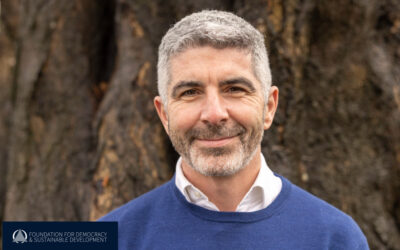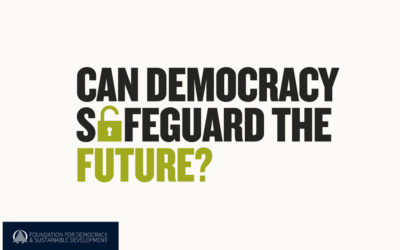The Foundation for Democracy and Sustainable Development (FDSD) is led by a group of trustees who are also directors of the company. The Chair of the board of trustees is Peter Davies.
Trustees
Paul Bradley
Paul is Policy and Public Affairs Manager at the Scottish Council for Voluntary Organisations (SCVO), where he works to ensure that the needs and concerns of the voluntary sector in Scotland are represented across various areas, including the Scottish economy, funding, strategic partnerships, and regulation. Paul founded SDG Network Scotland, a coalition of over 600 people and organisations who have led a successful multistakeholder method of SDGs governance, and secured and openly co-developed Scotland’s first independent national review on progress towards the SDGs, published in July 2020. His work on the SDGs saw him nominated by the Open Government Partnership and recognised as an emerging European young leader by the Obama Foundation. He has previously worked across housing, international trade, and open government policy areas and is a board member for Strathclyde University Students’ Union.
Peter Davies (Chair)
Peter’s career background is in the field of corporate responsibility working for the Confederation of British Industry, Department of Trade and Industry and Business in the Community. Awarded the OBE in 1995 for work in establishing links between business and education, Peter was Managing Director at Business in the Community UK from 1995 to 2005. He returned home to Wales in 2005 and was appointed Commissioner for Wales and Vice Chair of the UK Sustainable Development Commission. Following the closure of the UK Commission Welsh Government appointed him as Wales’ first Sustainable Futures Commissioner in April 2011. He played a lead role in the development of the Wellbeing of Future Generations (Wales) Act, particularly through leading the national conversation on the Wales we Want. He was also appointed to be the first independent chair of the Climate Change Commission for Wales in 2011 and carrying out both roles through to March 2016. Peter was awarded a CBE for his contribution to sustainable development in the Queen’s Birthday Honours list in June 2016. Peter was instrumental in the establishment of the Institute for Sustainability and Resource Effectiveness (INSPIRE) at the University of Wales Trinity St David in 2011 where he has an associate role as Professor of Practice. His current project portfolio focused on working in support of communities, citizens and consumers. It includes chairing the Wales Council for Voluntary Action, Welsh Water’s Customer Challenge Group, being a Director of Pembrokeshire Community Energy, and Community Custodian for River Simple.
Peter Davies 07976457032
Mike Egan
Mike Egan is a Chartered Accountant. He took early retirement from public practice in 2013 in order to concentrate entirely on voluntary trustee and governance work for charities and not-for-profits. Previously he had been a partner, and Head of Audit, in the London office of a multinational accountancy firm. Mike also holds a Masters degree in Voluntary Sector Management from Cass Business School (City, University of London).
John Lotherington
John Lotherington is Director of the 21st Century Trust and a Programme Associate at Salzburg Global Seminar, where he ran the health and healthcare innovation programmes until 2020. He is also a trustee of Cumberland Lodge and a governor of Goodenough College, London. His work across different organizations continually brings him back to democracy and sustainable development, and their inter-relationship, as key cross-cutting issues for present and future policymaking around the world. John began his career in history education and maintains an interest in that area. His publications as editor and author include: Years of Renewal: European History 1470-1600 (London: Hodder & Stoughton, 2nd ed. 1999); The Seven Ages of Life (London: Centre for Reform, 2002); The Tudor Years (London: Hodder & Stoughton, 2nd ed. 2003); and introductions to The Florentine Histories by Niccolo Machiavelli (New York: Barnes & Noble, 2004); The Book of the Courtier by Baldesar Castiglione (New York: Barnes & Noble, 2005), Infernoby Dante Alighieri (New York: Barnes & Noble, 2013) and The Prince by Niccolo Machiavelli (New York: Race Point Publishing, 2017).
Beth Smith
Beth is a Senior Manager at The Cynefin Co, and leads on work relating to Citizen Engagement and Democratic Innovation. She currently coordinates and advises on multiple participatory research projects and civic engagement projects (in every continent except Antarctica!). Her work has included advisory roles to the Singapore Government Ministry of Community, culture and Youth, as well as various municipal governments in Scandinavia, the UK and the USA. Her work is by it’s very nature transdisciplinary, but is heavily focused on sustainable development, participation and data science; working with pioneering techniques for participatory futures research and horizon scanning. She is an associate partner of LiFT, where her work has been exploring new politics and participation. She was previously a Policy Advisor to the Future Generations Commissioner for Wales, specialising in public involvement. Whilst her roots stem from an early career in the Voluntary sector where she worked for a County Voluntary Council, specialising in participatory research methods and community data use. She holds a Bachelors and Masters degree in the fields of Policing and Public Service Strategy.
Andrea Westall
Andrea Westall is an Economist, and Strategy & Policy Consultant. She is also a BSI Committee Member on Sustainable Performance, Consumption and Production, and on Social Value; as well as Adviser to the Impact Committee of the Big Exchange (sustainable investment fund platform). Over the past few years, she has been a Commissioner on the Independent Commission for Sustainable Equality, S&D Group, European Parliament.
Associates
Our associates bring their knowledge, skills and experience to help us take forward FDSD’s agenda.
Sándor Fülöp
Dr. Sándor Fülöp PhD was the first Parliamentary Commissioner for Future Generations of Hungary, a position he held from 2008 till 2012. Since 1994 he is a leader of Hungary’s principal non-profit environmental law firm: the Environmental Management and Law Association (EMLA). During his career at EMLA he has held a number of international positions. At present he is a full time teacher at the National University of Public Services at the Department of Sustainable Development. He participated in the drafting of the 1998 UN ECE Convention on Access to Information, Access to Decision-making and Access to Justice in Environmental Matters (the Aarhus Convention). Between 2002 and 2008 he was a member of the Compliance Committee of the Aarhus Convention.
Linda Geßner
Linda is a communication designer with a postgraduate degree in cultural studies, and has a longstanding experience working with not-for-profit and third sector organisations. She served i.a. as Deputy Chair for the United Nations Association of Germany Berlin/Brandenburg, and worked for the German Institute for Foreign Cultural Relations [ifa], Forum for the Future and the human rights agency Liberty. Specialising in communications and graphic design, she is currently leading the communications for CUSP and the All-Party Parliamentary Group on Limits to Growth. She is a Fellow of the Royal Society of Arts; and on a consultancy basis manages the events and digital communications for FDSD.
Graham Smith
Graham Smith is Professor of Politics and Director of the Centre for the Study of Democracy, University of Westminster. He is spending much of his time working as the founding Chair of the Knowledge Network on Climate Assemblies (KNOCA). His academic work focuses on democratic theory and practice, climate/environmental politics and the politics of the third sector/social economy. Graham is the author of a number of books, essays and official reports, including Democratic Innovations: Designing Institutions for Citizen Participation (Cambridge University Press, 2009) and Deliberative Democracy and the Environment (Routledge, 2003), and co-author of the popular textbook Politics and the Environment: From Theory to Practice (Routledge, 2012), now in its third edition. Recent publications include Democracy in a Pandemic: Participation in Response to Crisis and Can Democracy Safeguard the Future?. He was one of the organisers of the Citizens Assembly on Brexit in 2017 and is active in Participedia, a global knowledge platform for practitioners and academics on participatory governance and democratic innovation. Graham is a Senior Fellow at the Institute for Advanced Sustainability Studies (in Potsdam) and Honorary Fellow at the Centre for the Understanding of Sustainable Prosperity. He has also held fellowships at the European University Institute in Florence and the Harvard Kennedy School. Graham is currently working on a book on how to design democratic institutions for long-term thinking.
Cat Tully
Cat Tully is Director of FromOverHere, a consultancy providing strategy and foreign policy advice. Its mission is to support organisations – particularly governments – navigate a complex world. Cat has extensive experience as a practitioner, helping governments, civil society and businesses be more strategic, more effective, better prepared for the future and more involved as global citizens in an interconnected and uncertain world. Her motivating principles are a focus on social justice and the importance of multi-stakeholder approaches to address the challenges of the 21st Century. Cat is an Honorary Fellow of the Strategy and Security Institute at Exeter University and a Visiting Director at Wilton Park. She is also the co-founder of the School of International Futures, which promotes the use of strategic foresight. Cat was previously Strategy Project Director at the UK Foreign and Commonwealth Office and Senior Policy Adviser in the Prime Minister’s Strategy Unit. Before working in government, she worked in strategy and international relations across the not-for-profit and business sectors. Cat is also a trustee for Women ́s Health and Family Services in Tower Hamlets, a community-based health advocacy organisation working with Black and Ethnic Minority women and their families; a trustee of Involve, a public participation think tank; and a Global Board member of Academics Stand Against Poverty.






